How Cancer Survivors Can Overcome Feelings of Guilt

Feelings of guilt can sneak up on you after surviving cancer, and you're not alone in this. Many survivors wrestle with questions like, "Why me?" or "Did I deserve this outcome?" These emotions are natural and don’t make you weak. Addressing guilt in cancer survivors is essential for your emotional recovery. By facing these feelings, you open the door to healing and rediscovering joy in life. Remember, it's okay to feel this way, but you don't have to stay stuck. You deserve peace and happiness.
Key Takeaways
Notice and accept feeling guilty. Knowing these feelings are normal helps you start healing.
Be kind to yourself and forgive. Take small steps to let go of guilt.
Get help from a therapist if guilt feels too much. They can teach ways to handle your feelings.
Join groups to meet others like you. Talking about your experiences can make you feel less alone and happier.
Think about things you’re thankful for and hopeful about. Focusing on good parts of life can help you feel better and look forward to the future.
Addressing Guilt in Cancer Survivors

Understanding Survivor's Guilt
Survivor's guilt is a heavy feeling that can weigh on your mind after overcoming cancer. You might wonder why you survived when others didn’t. This guilt often stems from a sense of responsibility or even shame, even though you had no control over the outcomes of others. Many survivors feel they were "lucky" and question whether they deserved their recovery. These thoughts are common and part of the psychological dimension of survivor's guilt. Recognizing this guilt is the first step toward understanding it and finding ways to heal.
Common Triggers and Emotional Impact
Certain situations can make survivor's guilt feel even stronger. Hearing about someone who lost their battle with cancer or seeing others struggle with treatment can bring up feelings of sadness and guilt. You might also feel this way when reflecting on your own journey, especially if your recovery was smoother than expected. These emotions can lead to stress, anxiety, or even symptoms of PTSD. Addressing guilt in cancer survivors is crucial because it helps you manage these emotional challenges and promotes healing.
Why Acknowledging Guilt is the First Step
It’s hard to move forward when guilt is holding you back. Acknowledging your feelings doesn’t mean you’re weak—it means you’re brave enough to face them. When you admit that guilt is present, you can start to understand why it’s there and how it’s affecting your life. This awareness opens the door to emotional recovery and helps you take control of your healing process. By addressing guilt in cancer survivors, you’re giving yourself permission to grow and rediscover joy.
Strategies to Overcome Guilt
Practicing Self-Compassion and Forgiveness
Learning to forgive yourself is a powerful way to release guilt. It starts with self-compassion—treating yourself with the same kindness you’d offer a friend. You might feel like you don’t deserve forgiveness, but holding onto guilt only keeps you stuck. Instead, focus on understanding your emotions and taking small steps toward healing.
Here’s a helpful guide to practicing self-compassion and forgiveness:
Step | Description |
|---|---|
1 | Acknowledge the harm caused |
2 | Reflect on the feelings of guilt |
3 | Understand the impact of your actions |
4 | Accept responsibility |
5 | Make amends where possible |
6 | Engage in self-reflection |
7 | Practice self-compassion |
8 | Seek forgiveness from others |
9 | Commit to personal growth |
10 | Let go of self-judgment |
11 | Embrace acceptance and peace |
12 | Move forward with a healthier mindset |
Each step helps you let go of guilt and move toward a more peaceful state of mind. Remember, forgiving yourself doesn’t mean forgetting what happened. It means choosing to grow and live without the weight of guilt holding you back.
Seeking Professional Support, Including Therapy
Sometimes, guilt can feel overwhelming. If that’s the case, reaching out to a therapist or counselor can make a big difference. Professionals trained in emotional recovery can help you explore your feelings and develop strategies to cope. Therapy provides a safe space to talk about your guilt without fear of judgment.
You might consider cognitive-behavioral therapy (CBT), which focuses on changing negative thought patterns. Therapists can also guide you in mindfulness practices, helping you stay present and manage overwhelming emotions. Seeking professional support isn’t a sign of weakness—it’s a step toward reclaiming your emotional well-being.
Connecting with Support Groups and Communities
Joining a support group can be life-changing. These groups connect you with others who understand what you’re going through. Sharing your experiences and hearing others’ stories can help you feel less alone. Support groups provide a space to talk about your feelings, cope with treatment side effects, and find hope.
Here are some benefits of connecting with support groups:
They reduce feelings of isolation and promote emotional wellness.
Talking with others can lower anxiety and improve sleep.
Support networks help you manage practical challenges related to cancer treatment.
They encourage open communication with healthcare providers, leading to better care.
Being part of a community reminds you that you’re not alone in this journey. It’s a chance to build meaningful connections and find strength in shared experiences.
Mindfulness and Reframing Negative Thoughts
Using Mindfulness to Manage Emotions
Mindfulness can be a powerful tool to help you manage overwhelming emotions. It encourages you to focus on the present moment rather than dwelling on the past or worrying about the future. By practicing mindfulness, you can create a sense of calm and clarity, even when emotions like guilt or sadness feel overwhelming.
Mindfulness-Based Stress Reduction (MBSR) programs have shown remarkable results in helping cancer survivors regulate their emotions.
Mindfulness interventions have been shown to effectively reduce negative emotions such as anxiety and depression in cancer patients. For instance, Li et al. (2023) demonstrated that an 8-week mindfulness program significantly alleviated these negative emotions, aligning with the principles of Mindfulness-Based Stress Reduction (MBSR). Additionally, McCloy et al. (2022) and Lin et al. (2022) confirmed that mindfulness practices enhance emotional regulation and acceptance, which are crucial for managing the psychological challenges faced by cancer survivors.
You don’t need to be an expert to start practicing mindfulness. Simple activities like deep breathing, guided meditation, or even mindful walking can help you reconnect with your emotions and find balance. The key is to approach these practices with an open mind and patience.
Reframing Guilt into Opportunities for Growth
Guilt can feel like a heavy burden, but it doesn’t have to define your journey. By reframing guilt, you can transform it into a chance for personal growth. This process starts with acknowledging your feelings and understanding that guilt is a natural response to your experience.
Here are some ways reframing negative thoughts can improve your emotional health:
It helps you see obstacles as opportunities to grow stronger.
Practicing gratitude shifts your focus from challenges to the positives in your life, boosting resilience and happiness.
Optimistic thinking encourages you to stay committed to your recovery and embrace a brighter future.
When you reframe guilt, you allow yourself to learn from your experiences. For example, you might use your journey to inspire others or find new ways to give back to your community. These actions not only help you heal but also create a sense of purpose and fulfillment.
Building Resilience Through Positive Thinking
Positive thinking doesn’t mean ignoring the challenges you’ve faced. Instead, it’s about choosing to focus on hope and possibility. Building resilience through positive thinking can help you navigate the ups and downs of life after cancer.
Here’s how you can start:
Celebrate small victories, no matter how minor they seem. Each step forward is a sign of progress.
Surround yourself with people who uplift and support you. Their encouragement can strengthen your resolve.
Practice self-affirmations. Remind yourself daily of your strength and courage.
Transforming guilt into growth opportunities also plays a role in building resilience. Acknowledging your emotions, seeking support, and practicing self-compassion can help you move forward with confidence. Over time, these habits can make you feel more empowered and ready to embrace life’s possibilities.
Creating a Positive Future

Setting Realistic Goals for Post-Cancer Life
Setting goals can help you regain a sense of purpose and direction after cancer. Start small and focus on what feels achievable. Maybe you want to improve your physical health, reconnect with hobbies, or spend more time with loved ones. These goals don’t have to be big—they just need to be meaningful to you.
For example, one cancer survivor set a goal to return to distance running after treatment. She joined a program that combined goal-setting with lifestyle changes. Over time, she improved her sleep, adopted a plant-based diet, and successfully resumed running. Her overall well-being soared, showing how realistic goals can lead to positive changes.
You don’t have to tackle everything at once. Break your goals into smaller steps and celebrate each milestone. This approach builds confidence and keeps you motivated as you move forward.
Celebrating Small Wins and Progress
Every step forward matters, no matter how small. Did you take a walk today? Did you try a new recipe or spend time with friends? These moments are worth celebrating. Recognizing your progress helps you stay focused on the positives and reminds you of how far you’ve come.
Here’s a tip: keep a journal to track your wins. Write down one thing you’re proud of each day. Over time, you’ll see how much progress you’ve made. This practice boosts your mood and encourages you to keep going.
Small wins also build momentum. When you celebrate them, you’re more likely to stay motivated and tackle bigger challenges. Remember, progress isn’t about perfection—it’s about moving forward, one step at a time.
Focusing on Gratitude and Hope
Gratitude can shift your mindset and help you see the good in your life. Take a moment each day to reflect on what you’re thankful for. Maybe it’s the support of your family, the kindness of a friend, or even the strength you’ve shown during your journey.
Hope is just as important. It gives you the courage to dream about the future and believe in better days ahead. Tailored interventions, like focusing on physical activity, nutrition, and emotional support, have been shown to improve the quality of life for cancer survivors. These programs often include strategies to boost self-efficacy and readiness to change, helping you feel more empowered.
Gratitude and hope work hand in hand. Together, they create a positive outlook that can guide you toward a brighter future. By focusing on what you have and what’s possible, you can build a life filled with joy and purpose.
You’ve shown incredible strength by surviving cancer. That resilience is something to be proud of. Forgiving yourself and prioritizing your emotional well-being are key steps toward living a fulfilling life.
Remember, you’re not defined by guilt or fear. You’re defined by your courage to keep moving forward.
Embrace this new chapter with hope and gratitude. Surround yourself with people who lift you up, and don’t hesitate to seek support when you need it. Life after cancer is a gift—one you deserve to live fully and joyfully.
FAQ
What is survivor's guilt, and why do I feel it?
Survivor's guilt happens when you question why you survived while others didn’t. It’s a natural emotional response to a life-changing event like cancer. You might feel responsible or undeserving, but remember, your recovery isn’t something you caused or controlled.
How can I stop feeling guilty about surviving?
Start by acknowledging your feelings. Practice self-compassion and remind yourself that guilt doesn’t define you. Talking to a therapist or joining a support group can also help you process these emotions and move forward.
Is it normal to feel guilty even after recovery?
Yes, it’s completely normal. Guilt can linger even after you’ve physically healed. Emotional recovery takes time, and it’s okay to seek help or take small steps to address these feelings.
Can mindfulness really help with guilt?
Absolutely! Mindfulness helps you focus on the present and manage overwhelming emotions. Simple practices like deep breathing or meditation can reduce stress and help you reframe negative thoughts into positive ones.
Should I talk to others about my guilt?
Yes, sharing your feelings can be incredibly healing. Whether it’s with a trusted friend, family member, therapist, or support group, opening up helps you feel less alone and more understood. You don’t have to carry this burden by yourself.
See Also
Identifying Key Signs Associated With Kidney Cancer
Exploring Symptoms and Risk Factors of Anal Cancer
Recognizing Symptoms and Treatment Options for Duodenal Cancer

